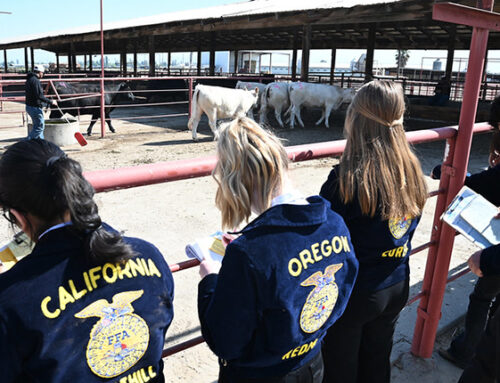As spring semester classes start today (Jan. 17) at California State University, Fresno, the letter “i” is coming to life.
That’s “i” as in iPod.
With students increasingly expecting a campus to accommodate digital lifestyles and individual learning needs, Fresno State faculty are providing easily accessible education that moves directly from their computers to their iPods or other audio player.
Fresno State and a handful of other California State University campuses are using podcasting to make educational materials more accessible.
A podcast is a media file that is distributed by subscription over the Internet using syndication feeds, for playback on iPods and similar mobile devices and personal computers.
“Basically this is learning on the go for students like me,” said Wes Crockett, a Fresno State junior majoring in business.
A podcast’s content can be anything conveyed by an audio or video file. Instructors create a podcast of daily assignments and lectures from class, then make it available for their students. Students can likewise create and send material to their professors or other students.
For the future, the CSU system is working with Apple to use iTunes U, a full-time free service for more than just music. iTunes U provides access to educational content such as lectures, interviews, campus news and class notes regardless of where a student is.
JoLynne Blake, one of Fresno State’s podcasting coordinators, said, “This is the next step in technology for our campus. Ultimately, this advancement will help in the teaching, learning, and research of our students by expanding ways they can learn.”
Student-athlete Taylor Siebert takes advantage of podcasting while on the road with the women’s golf team.
“It was very simple to use and I would absolutely recommend it to other student-athletes as well as all other students,” said Siebert, a sophomore. “I found that it was not as effective as attending class, however, it was a much better option than having to completely miss class.”
Dr. Gerald McMenamin, a professor of linguistics, began podcasting in the fall, primarily in his lower-division, general education classes. The podcasts, along with digital pictures of in-class whiteboard work by students, were made available immediately after class on Blackboard, a higher education online learning system.
“I was motivated by Provost Echeverria’s urging that we do something to accommodate the difficult schedules of Fresno State athletes, especially their need to be away on class days,” McMenamin said. “However, in our student population, athletes are not alone in having nonacademic tugs on their time and attention.”
McMenamin noticed that another group of students that typically missed class a lot were young mothers. Students with identified learning challenges also are able to use the podcasts to listen a second time to material in classes they attended.
Overall, approximately 20 percent of his students used the podcasting at least once.
“Based on my students’ use and reactions, I think it is very effective,” McMenamin said. “The podcasts and pictures give students who are away the feeling of being in the class. Sometimes the students in class even greet the absent ones, wish them well in their game, or they want their own picture taken with the work they did on the whiteboard.”
McMenamin allows his students to use a podcast and take a followup quiz up to five times a semester in lieu of class attendance.
“Podcasting makes both the teacher and student academically responsible,” he said. “It does not ignore the problem, and from my experience the student actually completes his/her work.”
Dr. Gary Reichard, executive vice chancellor and chief academic office at CSU, said the fact that both students and faculty are familiar with iPods greatly enhances the learning of podcasting technology.
“Walking across a CSU campus, it seems that every other student is listening to an iPod. That’s why this technology is such a natural fit to our campuses, and iTunes U represents a vehicle for learning and communication that students and professors have already embraced,” he said.
“This software and its applications complement CSU’s objective to continually adopt the latest technologies for enhancing learning on and off campus,” he said.
(Copy by University Communications student-intern Megan Jacobsen.)
As spring semester classes start today (Jan. 17) at California State University, Fresno, the letter “i” is coming to life.
That’s “i” as in iPod.
With students increasingly expecting a campus to accommodate digital lifestyles and individual learning needs, Fresno State faculty are providing easily accessible education that moves directly from their computers to their iPods or other audio player.
Fresno State and a handful of other California State University campuses are using podcasting to make educational materials more accessible.
A podcast is a media file that is distributed by subscription over the Internet using syndication feeds, for playback on iPods and similar mobile devices and personal computers.
“Basically this is learning on the go for students like me,” said Wes Crockett, a Fresno State junior majoring in business.
A podcast’s content can be anything conveyed by an audio or video file. Instructors create a podcast of daily assignments and lectures from class, then make it available for their students. Students can likewise create and send material to their professors or other students.
For the future, the CSU system is working with Apple to use iTunes U, a full-time free service for more than just music. iTunes U provides access to educational content such as lectures, interviews, campus news and class notes regardless of where a student is.
JoLynne Blake, one of Fresno State’s podcasting coordinators, said, “This is the next step in technology for our campus. Ultimately, this advancement will help in the teaching, learning, and research of our students by expanding ways they can learn.”
Student-athlete Taylor Siebert takes advantage of podcasting while on the road with the women’s golf team.
“It was very simple to use and I would absolutely recommend it to other student-athletes as well as all other students,” said Siebert, a sophomore. “I found that it was not as effective as attending class, however, it was a much better option than having to completely miss class.”
Dr. Gerald McMenamin, a professor of linguistics, began podcasting in the fall, primarily in his lower-division, general education classes. The podcasts, along with digital pictures of in-class whiteboard work by students, were made available immediately after class on Blackboard, a higher education online learning system.
“I was motivated by Provost Echeverria’s urging that we do something to accommodate the difficult schedules of Fresno State athletes, especially their need to be away on class days,” McMenamin said. “However, in our student population, athletes are not alone in having nonacademic tugs on their time and attention.”
McMenamin noticed that another group of students that typically missed class a lot were young mothers. Students with identified learning challenges also are able to use the podcasts to listen a second time to material in classes they attended.
Overall, approximately 20 percent of his students used the podcasting at least once.
“Based on my students’ use and reactions, I think it is very effective,” McMenamin said. “The podcasts and pictures give students who are away the feeling of being in the class. Sometimes the students in class even greet the absent ones, wish them well in their game, or they want their own picture taken with the work they did on the whiteboard.”
McMenamin allows his students to use a podcast and take a followup quiz up to five times a semester in lieu of class attendance.
“Podcasting makes both the teacher and student academically responsible,” he said. “It does not ignore the problem, and from my experience the student actually completes his/her work.”
Dr. Gary Reichard, executive vice chancellor and chief academic office at CSU, said the fact that both students and faculty are familiar with iPods greatly enhances the learning of podcasting technology.
“Walking across a CSU campus, it seems that every other student is listening to an iPod. That’s why this technology is such a natural fit to our campuses, and iTunes U represents a vehicle for learning and communication that students and professors have already embraced,” he said.
“This software and its applications complement CSU’s objective to continually adopt the latest technologies for enhancing learning on and off campus,” he said.
(Copy by University Communications student-intern Megan Jacobsen.)



